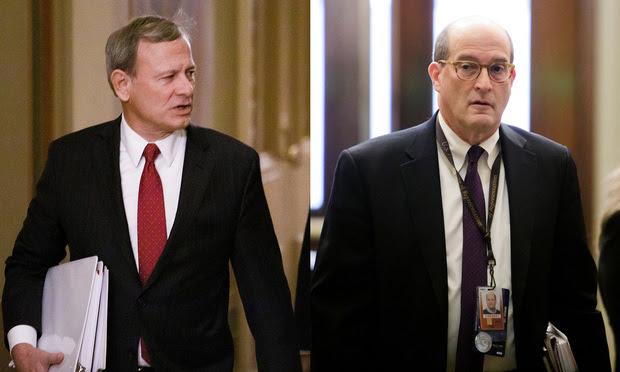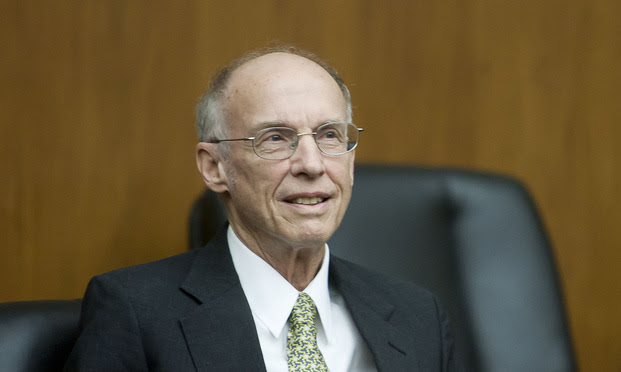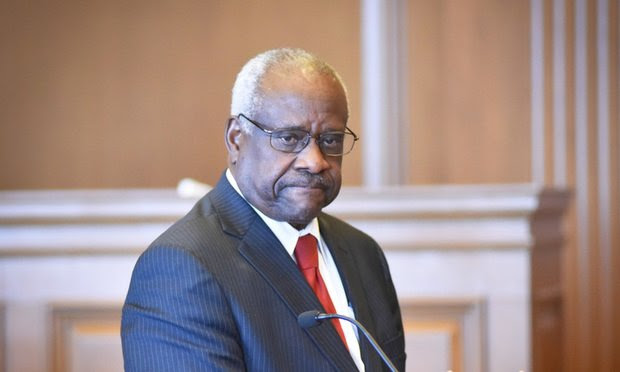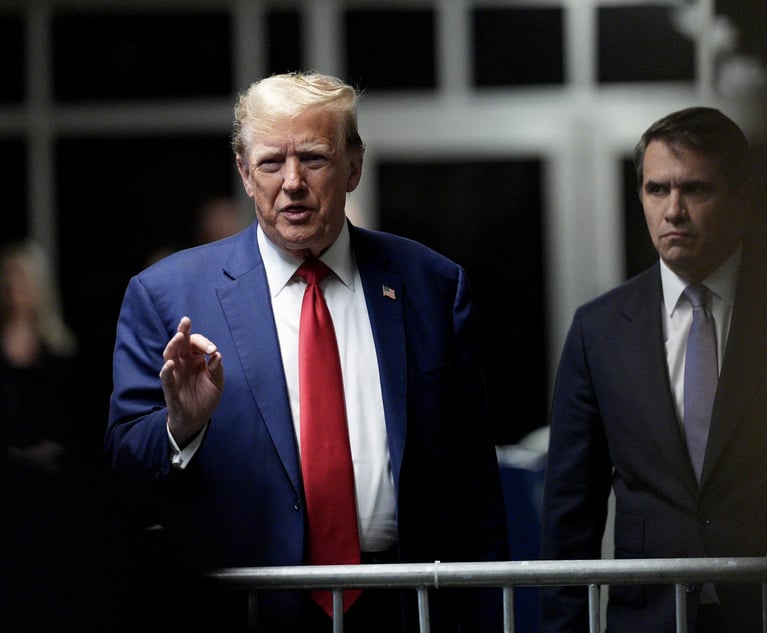Trump Watch: The Trump v. House Fights Are Up To The Justices Now
It's not clear how the justices will rule, although it was clear they were a bit concerned about how expansive the House's investigative and subpoena powers are.
May 15, 2020 at 07:30 AM
11 minute read
Hi, and welcome back to Trump Watch! Congrats to all of us for progressing from this 30 Rock meme to this 30 Rock meme. Long live 30 Rock, long live night cheese, muffin top and Werewolf Bar Mitzvah. What TV show have you been returning to during the pandemic? Send your recommendations to [email protected], and follow me on Twitter at @jacq_thomsen.

The House Got to the Supreme Court. No One Knows If They'll Win.
This week featured the last oral arguments of the U.S. Supreme Court term, and it was a doozy: House subpoenas, grand jury subpoenas, faithless electors, Frodo Baggins—everyone had fun.
The House was in the spotlight with the justices on Tuesday, with general counsel Doug Letter arguing in favor of subpoenas seeking President Donald Trump's tax records from third parties. He got two rounds of questioning during arguments, lucky him! And DOJ got some speaking time too, courtesy of principal deputy solicitor general Jeff Wall. Patrick Strawbridge of Consovoy McCarthy argued for Trump: He and Wall both urged the justices to set limits on the subpoenas.
It's not clear how the court will rule, although it was clear that the justices were a bit concerned about just how expansive the House's investigative, and therefore subpoena, power is. And once again all eyes are on Chief Justice John Roberts on how exactly he'll rule on the cases, with many thinking he's the swing justice.
I checked in with some former House lawyers to get their take on the arguments. Here's what they had to say:
>> Thomas Hungar, Gibson, Dunn & Crutcher partner and House general counsel from 2016-2019: "I didn't think there was anything surprising about the argument. I think for the Supreme Court, it's a hard case because they've got a lot of sweeping language in their opinions, but they've obviously got concerns about the implications of going as far as the House wants them to go. I think maybe the most telling point was when Justice Breyer said to Doug Letter, 'what I hold today will also apply to a future Senator McCarthy asking a future Franklin Roosevelt or Harry Truman exactly the same questions, that bothers me.' That's the problem, because of this sweeping language in these Supreme Court cases about how Congress is entitled to obtain information about anything pertaining to a subject about which legislation could be had, which is basically anything. Doug was, quite appropriately, taking that hardline position. But when you have a situation like this, where it's being used for the first time in the Supreme Court anyway, to get private papers from a sitting president—it ups the stakes in a way the court has not had to deal with before. You could see the justices trying to imagine, could it really be there's no limitation and can we live with those consequences?"
>> Thomas Spulak, King & Spalding partner and House general counsel from 1994-1995: "I thought the questions were really good. I thought the questions were focused on the issue, there weren't any crazy hypotheticals that would have put either side in a tough situation. I think the House was in a harder position to defend. I think Letter did a great job. The way the justices approached it, I think was a fair line of reasoning—that is, the House's position is that you can investigate anywhere where you can legislate. And there's no doubt that the aperture of the House's legislative authority, constitutional authority is extremely broad. If your investigative authority follows along, is there nothing that the House can't investigate and therefore nothing that anyone can attempt to oppose? I think that the House's premise is 100% correct. I don't think there was a great answer to the question, are there any limits and what sort of guidelines can we, in the future, apply? I don't believe there's any way that you can say there are some things we can't investigate even though we can legislate, because if you concede that point then that House is conceding that it doesn't have broad legislative power and broad investigative power. There is the Kilbourn case, so at least we know there's some instance where a court has found that the power isn't there. Hopefully the court will take an expansive view of the House's investigative power and perhaps says, this is something that we'll have to deal with when we look at the facts of a case."
>> William Pittard, KaiserDillon partner and House deputy general counsel 2011-2016: "The president's position, in my view, really is brazen. He's asking the courts to compel others not to comply with subpoenas from a coordinate branch of government. And he's not doing that on privilege grounds or on the basis of some other constitutional prerogative. Rather, he wants the courts to compel non-compliance simply on a determination that the purposes animating the congressional investigation are not sufficiently genuine or important. That strikes me as an invitation to an impossible task. Certainly it is one that the courts traditionally, and for good reason, have refused to undertake. I was optimistic ahead of the arguments because the Supreme Court seemingly has worked to be unanimous for big separation of powers cases, and I thought there was an opportunity for that here. In listening to the argument, though, several justices suggested a willingness to revisit the court's usual hands-off approach regarding the relative merits of congressional subpoenas, and congressional investigations more broadly. I suspect, however, that ultimately at least a majority of the court will not want to make the judiciary the arbiter on such issues. We'll see."
SPONSORED BY ALM PARTNERS
Time Management: Vital Principles to Help you Stay on Track Whilst Working from Home
Most people imagine that working from home is a casual affair that should not be treated with seriousness. However, if you are thinking about venturing into any form of home business, you have to acknowledge the fact that it requires as much seriousness as any other business. READ MORE

These Judges Got Pretty Mean Over A Trump Emoluments Lawsuit
Trump got dealt a tough hand at the U.S. Court of Appeals for the Fourth Circuit on Thursday as the en banc court ruled an emoluments clause lawsuit against him could move forward in district court, meaning litigators can potentially get access to financial records on the president's businesses.
It was a 9-6 ruling by the court, which heard the arguments in mid-December. The court's majority opinion was a narrow finding that while they recognized the special authorities surrounding the presidency, Trump still hadn't met the criteria to petition the court in the case.
To say the dissenting judges were unhappy with that finding is an understatement. One dissenting opinion accused the court's majority of holding themselves above the law by ruling on the case in the first place and not throwing out the lawsuit. "By discarding centuries of settled practice and precedent that kept true to the genius of the Constitution and its separation of powers, the majority has only confirmed one of the Founders' worst fears: that, while no man may be above the law, a group of judges, so emboldened, may consider themselves beyond it," Judge J. Harvie Wilkinson wrote.
A concurring opinion said, no, you're the ones who are undermining the judiciary! "Editorial writers, political speechwriters, and others are free, of course, to make a career out of accusing judges who make decisions that they dislike of bias and bad faith. But the public's confidence and trust in the integrity of the judiciary suffer greatly when judges who disagree with their colleagues' view of the law accuse those colleagues of abandoning their constitutional oath of office," Judge James Wynn wrote.
Another dissent urged Trump's lawyers at Consovoy McCarthy to take the case up to the U.S. Supreme Court. Remember, this is while the case is in the discovery stages at the district court, which is why the appeals court's majority said it couldn't rule on the issue in the first place.
D.C. Attorney General Karl Racine, who has teamed up with Maryland Attorney General Brian Frosh for the lawsuit, said during a press call Thursday that if Trump does take the case up to the Supreme Court, they'll fight it there as well. Meanwhile they've issued 38 subpoenas to entities like the Trump Organization, the GSA—the leaseholder for Trump's D.C. hotel—and other entities like the State Department to figure out more information about who the hotel is profiting from. Supreme or district court, stay tuned!

What We're Reading
>> 'We All Know It's About the President': Trump Finds Defenders at Supreme Court in Tax Returns Case: "The court's conservative majority seemed more sympathetic than their liberal colleagues to Trump's challenge to subpoenas by three House investigating committees, but there appeared to be openness across the bench to the needs of a state grand jury investigating possible criminal activity by Trump and his businesses. 'At some point there's a straw that breaks the camel's back,' Justice Clarence Thomas told Douglas Letter, general counsel of the U.S. House." [National Law Journal]
>> Flynn Judge Picks Debevoise Lawyer to Argue Against Barr DOJ's Bid to Dump Case: "U.S. District Judge Emmet Sullivan selected [John} Gleeson a day after signaling his interest in hearing outside views on the Justice Department's sudden abandonment of the Flynn case, a move that renewed criticism that U.S. Attorney General William Barr was intentionally trying to undermine the special counsel's Russia investigation and to interfere to protect an ally to President Donald Trump. Gleeson, a former federal judge in Brooklyn, was among Barr's critics. Just days ago, he co-authored an op-ed in The Washington Post noting that Sullivan could reject the Justice Department's motion to dismiss the Flynn case and hand down a sentence." [National Law Journal]
>> DC Circuit Tells Lawyers in Clinton Emails Case: What's Left to Resolve?: "A federal appeals court panel on Thursday injected some doubt over whether Hillary Clinton will be forced to sit for a rare deposition confronting her practice of using a private email server during her time as U.S. secretary of state. The new order from the U.S. Court of Appeals for the D.C. Circuit asked the lawyers in the Freedom of Information Act case to address whether there is still a pending controversy to resolve…. Williams & Connolly partner David Kendall, lead counsel for Clinton, has argued she has broadly addressed her private email before Congress, the FBI and news reporters, and therefore she has nothing more to say." [National Law Journal]
>> Trump campaign spending unprecedented sums on legal fees as lawsuits pile up: "The Trump campaign has spent more than $16 million on legal and compliance services between the 2018 and 2020 election cycles, according to OpenSecrets' analysis of campaign expenditures. That sum accounts for roughly 10 percent of the campaign's total spending through the end of March. No other presidential campaign has ever spent that much money on legal services, including President George Bush's 2004 reelection campaign ($8.8 million), Hillary Clinton's 2016 campaign ($6.5 million) and President Barack Obama's 2012 reelection campaign ($5.5 million). Presumptive Democratic nominee Joe Biden has spent roughly $1.3 million on legal services this cycle." [OpenSecrets]
>> Trump increasingly engaged in legal battles unfolding over mail-in voting: "Trump met with his political aides on Thursday at the White House about the legal efforts, a source familiar with the meeting said….The source said Trump has been particularly interested in combating ballot harvesting, which allows party officials and outside organizations to collect signed and sealed mail-in ballots, a practice legal in some states. And he has been pleased with the efforts being made to combat Democratic legal maneuvers, which include opposing a push by Democrats to eliminate ballot signature match requirements and to automatically mail ballots to all eligible voters, including inactive voters." [CNN]
That's all folks! Thanks for reading Trump Watch, I'll be back next week.
This content has been archived. It is available through our partners, LexisNexis® and Bloomberg Law.
To view this content, please continue to their sites.
Not a Lexis Subscriber?
Subscribe Now
Not a Bloomberg Law Subscriber?
Subscribe Now
NOT FOR REPRINT
© 2025 ALM Global, LLC, All Rights Reserved. Request academic re-use from www.copyright.com. All other uses, submit a request to [email protected]. For more information visit Asset & Logo Licensing.
You Might Like
View All
Legal Speak's 'Sidebar with Saul' Part II: GOP Pols Push Misinformation, Cohen Keeps It Together
1 minute read
Trump Barred From Appearing on Illinois Ballot as Overarching SCOTUS Decision Looms
4 minute read

The Judiciary's Electronic Court System Gets Poor Marks | Plus, A Look at Judicial Noms' Pay
6 minute readLaw Firms Mentioned
Trending Stories
- 1Linklaters Hires Four Partners From Patterson Belknap
- 2Law Firms Expand Scope of Immigration Expertise, Amid Blitz of Trump Orders
- 3Latest Boutique Combination in Florida Continues Am Law 200 Merger Activity
- 4Sarno da Costa D’Aniello Maceri LLC Announces Addition of New Office in Eatontown, NJ, and Named Partner
- 5Friday Newspaper
Who Got The Work
J. Brugh Lower of Gibbons has entered an appearance for industrial equipment supplier Devco Corporation in a pending trademark infringement lawsuit. The suit, accusing the defendant of selling knock-off Graco products, was filed Dec. 18 in New Jersey District Court by Rivkin Radler on behalf of Graco Inc. and Graco Minnesota. The case, assigned to U.S. District Judge Zahid N. Quraishi, is 3:24-cv-11294, Graco Inc. et al v. Devco Corporation.
Who Got The Work
Rebecca Maller-Stein and Kent A. Yalowitz of Arnold & Porter Kaye Scholer have entered their appearances for Hanaco Venture Capital and its executives, Lior Prosor and David Frankel, in a pending securities lawsuit. The action, filed on Dec. 24 in New York Southern District Court by Zell, Aron & Co. on behalf of Goldeneye Advisors, accuses the defendants of negligently and fraudulently managing the plaintiff's $1 million investment. The case, assigned to U.S. District Judge Vernon S. Broderick, is 1:24-cv-09918, Goldeneye Advisors, LLC v. Hanaco Venture Capital, Ltd. et al.
Who Got The Work
Attorneys from A&O Shearman has stepped in as defense counsel for Toronto-Dominion Bank and other defendants in a pending securities class action. The suit, filed Dec. 11 in New York Southern District Court by Bleichmar Fonti & Auld, accuses the defendants of concealing the bank's 'pervasive' deficiencies in regards to its compliance with the Bank Secrecy Act and the quality of its anti-money laundering controls. The case, assigned to U.S. District Judge Arun Subramanian, is 1:24-cv-09445, Gonzalez v. The Toronto-Dominion Bank et al.
Who Got The Work
Crown Castle International, a Pennsylvania company providing shared communications infrastructure, has turned to Luke D. Wolf of Gordon Rees Scully Mansukhani to fend off a pending breach-of-contract lawsuit. The court action, filed Nov. 25 in Michigan Eastern District Court by Hooper Hathaway PC on behalf of The Town Residences LLC, accuses Crown Castle of failing to transfer approximately $30,000 in utility payments from T-Mobile in breach of a roof-top lease and assignment agreement. The case, assigned to U.S. District Judge Susan K. Declercq, is 2:24-cv-13131, The Town Residences LLC v. T-Mobile US, Inc. et al.
Who Got The Work
Wilfred P. Coronato and Daniel M. Schwartz of McCarter & English have stepped in as defense counsel to Electrolux Home Products Inc. in a pending product liability lawsuit. The court action, filed Nov. 26 in New York Eastern District Court by Poulos Lopiccolo PC and Nagel Rice LLP on behalf of David Stern, alleges that the defendant's refrigerators’ drawers and shelving repeatedly break and fall apart within months after purchase. The case, assigned to U.S. District Judge Joan M. Azrack, is 2:24-cv-08204, Stern v. Electrolux Home Products, Inc.
Featured Firms
Law Offices of Gary Martin Hays & Associates, P.C.
(470) 294-1674
Law Offices of Mark E. Salomone
(857) 444-6468
Smith & Hassler
(713) 739-1250








